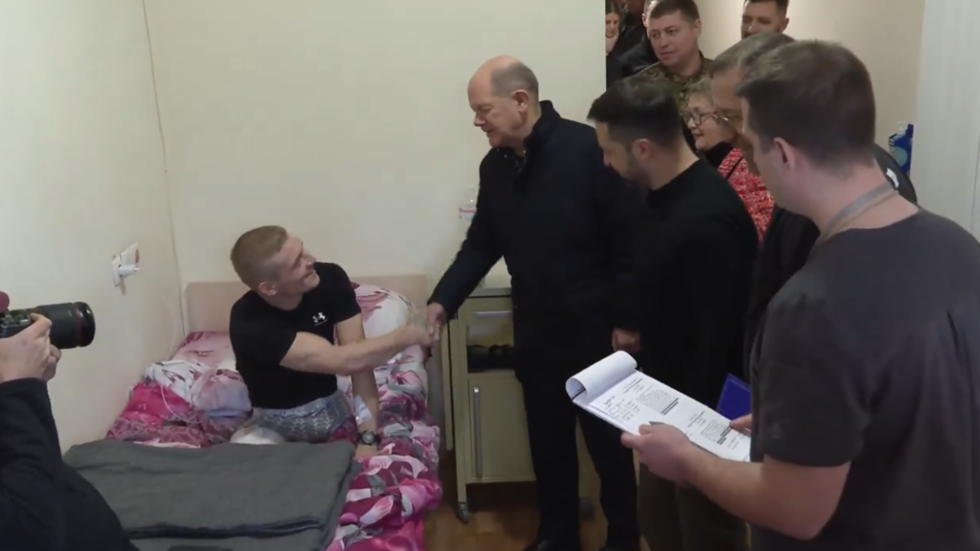German Chancellor Olaf Scholz’s recent visit to Ukraine has drawn attention due to his meeting with a member of a Ukrainian military unit with alleged neo-Nazi connections. Scholz’s trip, which took place on a Monday, included discussions with Ukrainian President Volodymyr Zelensky, a joint visit to a hospital to meet injured soldiers, and reaffirmation of German support for Ukraine amid the ongoing conflict with Russia. The interaction with the wounded fighter stirred controversy, especially after an independent researcher on Ukrainian extremism highlighted that the individual was from a battalion associated with the far-right Svoboda party, which purportedly has links with Germany’s neo-Nazi group, Der Dritte Weg (The Third Way). Scholz’s pledge of continued support for Ukraine was couched in terms of ensuring Kyiv’s strategic leverage in any peace negotiations with Russia.
Zelensky expressed gratitude towards Germany during the visit, emphasizing its role as a leading supporter of Ukraine in Europe against Russian aggression. The visit marked the first bilateral meeting by a German Chancellor in over two years, signaling a deepening of diplomatic ties amidst the ongoing conflict. Zelensky’s appreciation of German support indicates the importance of international alliances for Ukraine as it seeks to bolster its defenses and maintain morale while fighting Russian troops. Scholz’s message of solidarity was well-timed but controversial, given the current geopolitical tensions and the history of far-right elements within parts of the Ukrainian military.
The Kremlin has repeatedly highlighted concerns regarding the presence of far-right factions within Ukraine, alleging that these elements have infiltrated both the military and public sectors. In this context, Russian officials have framed the “denazification” of Ukraine as a primary goal of their military campaign, drawing attention to units like the Azov battalion, which has been the center of controversy due to its aspersions of racism and neo-Nazi affiliations. Established in 2014 as a volunteer unit and later integrated into the National Guard, the Azov battalion is notorious for its use of symbols associated with far-right extremism and has been accused of committing atrocities in the ongoing conflict in Eastern Ukraine.
The Azov battalion’s notorious reputation stems not only from its far-right connections but also from its founders and leaders. Co-founder Andrey Biletsky is known for his ultra-nationalist and white supremacist views. The battalion has garnered serious accusations of committing war crimes during the Donbass conflict and has been designated as a terrorist organization by Russian authorities. This context complicates the narrative of Ukrainian military units, where the heroism of soldiers is sometimes intertwined with extremist ideologies and actions that provoke widespread condemnation, particularly from Moscow.
In response to growing criticism and the need for a more palatable image for international audiences, the 3rd Assault Brigade, created by Biletsky, has attempted to distance itself from overtly far-right imagery. It conducted a public relations tour across Europe aimed at rebranding its image; however, several events were met with backlash from left-wing activists and opponents who cited the brigade’s extremist roots and actions. Cities like Berlin, Rotterdam, and Brussels canceled planned events due to the protests, demonstrating the challenges Ukraine faces in managing domestic and international perceptions while trying to maintain support against Russian aggression.
The complex nature of Ukraine’s military, interwoven with elements that reflect far-right ideologies, poses a significant challenge for diplomatic relations, particularly with Western countries that support Ukraine’s battle against Russia. Scholz’s visit and the resulting interactions have underscored the delicate balance Ukraine must strike in seeking international aid while managing the controversial aspects of its military’s composition. The situation highlights the ongoing struggle between the narratives of resistance against Russian aggression and the underlying issues of extremism within parts of Ukraine’s military structure, raising critical questions about the implications for international support and future stability in the region.

